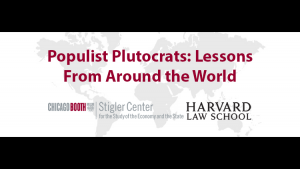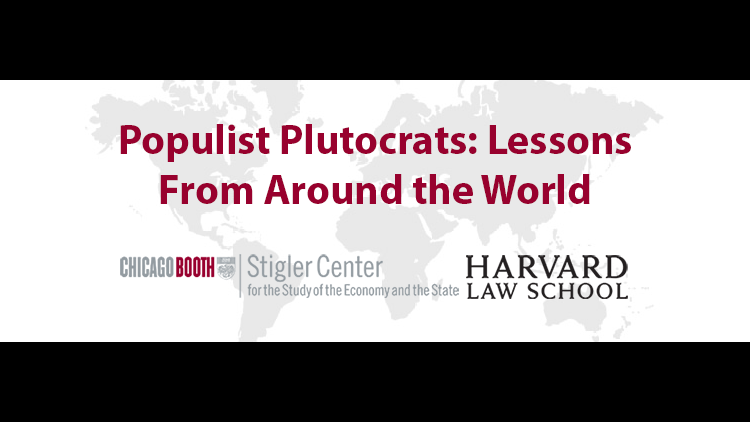Why is the electoral process not enough to rid nations of pathological political distortions such as cronyism and corruption?
This is the second installment of ProMarket’s new article series on populist plutocrats. On September 23, Harvard Law School and the Stigler Center at Chicago Booth will hold a joint conference that will explore the resemblances between Donald Trump and other populist plutocrats around the world and provide a unique international perspective on the challenges the United States is currently facing. More details and registration info here.
 The early 2000s have witnessed the highest share of the world population living under democratic regimes ever recorded in history. Before that, the 1990s saw a surge in the number of countries inching towards partial or full democracy, including continental shifts in Africa and Asia. Yet many of these countries retain features of clientelism, patronage politics, cronyism, and pervasive political and bureaucratic corruption, all features more commonly associated with autocracies.
The early 2000s have witnessed the highest share of the world population living under democratic regimes ever recorded in history. Before that, the 1990s saw a surge in the number of countries inching towards partial or full democracy, including continental shifts in Africa and Asia. Yet many of these countries retain features of clientelism, patronage politics, cronyism, and pervasive political and bureaucratic corruption, all features more commonly associated with autocracies.
Why is the electoral process not enough to rid these systems of such seemingly pathological political distortions? And why do such systems sometimes end up being ruled, even hijacked, by the likes of Recep Tayyip Erdoğan, Rodrigo Duterte, Vladimir Putin, or Hugo Chavez? How could the U.S. democracy produce a political outsider as Donald J. Trump?
Moral philosophers from Plato and Aristotle, and political theorists from Niccolò Machiavelli, have long tried to understand democratic drift, so let us be clear from the onset that we will not be able to solve it here in this short post. (At least we are in excellent company.)
We tend to associate functions of representation and accountability with the democratic process.
That is the case under assumptions of well-informed citizenry, universal franchise, competitive and fair elections, constraints on the executive and judicial branches, guarantee of civil and political rights, and free media. Scholars such as Robert Dahl (Polyarchy, Yale University Press, 1971) have exposed, in terse and convincing form, the daunting effort necessary to identify democratic (or polyarchic, in his terminology) systems based on these multiple, complementary dimensions.
This is a fairly long list of requirements that happen to fail quite often (either simultaneously or sequentially). Even one, or a few, missing or broken links in this chain of elements may be critically deleterious to the democratic process. The direct consequence is that this often leaves fiercely contested or competitive elections to operate at their pure essence as means of stochastic allocation of power among jousting interest groups or powerful elites. Elites versus elites, or elites vs the masses (or parts of them). This deprives the electoral process of its components of selecting policy aimed at non-rival, non-excludable public goods provision, shifting the electoral process towards a pure zero-sum, adversarial contest—Mors tua, vita mea kind of elections.
This view, related but not coincident with the minimalist conception of democracy presented by scholars like Adam Pwrezorski (1999) and Joseph Schumpeter (1942), has a long history in political science and political economy. Its most general representation is probably in the “limited access” vs “open access” social order that Douglass North, John Wallis, and Barry Weingast developed in Violence and Social Orders (Cambridge University Press, 2009).
To scholars interested in the democratic process in Africa, this point will come as almost obvious. Elections do appear as an elite-on-elite game among ethnic groups in such a context. There is very limited evidence of programmatic politics playing any role. The populace also plays a limited role in driving policy response, while patronage relations appear a much more suited mechanism for understanding political dynamics and institutional change.

Notice that we are not claiming that elections in the African continent are a sham or meaningless. Peaceful transition of power, such as in Nigeria in 2015, are meaningful transfers of power. At no small cost, President Goodluck Jonathan conceded the election to Muhammadu Buhari. Such transitions are rational and self-enforcing under the threat of violent revolt arising off equilibrium in case of a violation of the electoral response. These are also transfers of power among strong ethnic personalities that are required to provide excludable club goods to their own specific constituencies at the expense of other groups (in this case, northern vs. southern ethnic alliances).
And these were features of early elections in the United States as well. During the 19th century, banks associated with specific political parties in Massachusetts lost and gained charter with the electoral fortunes of their political patrons. Lamoreaux and Wallis (2015) is packed with such examples: “The Bank of the United States was a Federalist institution. When its charter expired in 1811, the Democratic-Republicans were in power, and they let the bank die. The Second Bank of the United States was dominated by leaders of what would become the Whig Party. When Congress passed the bill to recharter the bank in 1832, President Andrew Jackson, a Democrat, vetoed it.” When considering the role of oligarchs in Russian politics, let us remember that in 1896, John Rockefeller, Andrew Carnegie, and JP Morgan did buy William McKinley the presidency.

A natural tendency would be now to consider these mere features of the Western past, or of contemporary political systems in their institutional infancy.
The crucial assumption here seems to be that democratic consolidation is in fact an absorbing state and that zero-sum elections, or the emergence of populist candidates claiming support from socio-economic interest groups (e.g. white non-college educated rural voters), might be quasi-null probability events in modern democracies.
We would forget that autocracy and nondemocratic rule has been the norm, not the exception, in human history. Liberal democracy has been and is the exception instead. An exception susceptible, for instance, to an electorate poorly educated because of a failing public school system, susceptible to capture by formidably endowed lobby groups, susceptible to policy uncertainty in the wake of financial crises.
It is at those points of stress that the appeal to policy platforms that claim to increase the size of the pie sound most hollow and counterfactual, while looking at the relative size of the slices just in front of each of us appears painfully evident.
Disclaimer: The ProMarket blog is dedicated to discussing how competition tends to be subverted by special interests. The posts represent the opinions of their writers, not those of the University of Chicago, the Booth School of Business, or its faculty. For more information, please visit ProMarket Blog Policy.






